Straw Wars: Plastic Reduction - a new battleground for Brand Reputation
So where did it start
In 1869 a New York firm offered $10,000 to anyone who could provide a substitute to ivory, which was in high demand for the production of billiards balls. In response John Wesley Hyatt produced a synthetic plastic and for the first time, human manufacturing was not constrained by the limits of nature. Advertisers were quick to praise plastic as the saviour of the animals such as the elephant and the tortoise and natural resources such as woodland. In its origin plastic was expected to prove beneficial to the environment.
What Happened?
Cheap, versatile and easy to mass produce, the birth of consumerism led to exponential growth in plastic production from 1.5m metric tonnes globally in 1950, to 100m tonnes by 1989, and up to 359m tonnes today. Unlike the natural materials plastic has come largely to replace, plastics decompose at a glacial rate – which makes single use plastics in particular such an environmental scourge. As much as 8 million metric tonnes of plastic per year is estimated to find its way into oceans globally and by 2050 it is estimated that by mass, there will be more plastic in the oceans than fish.
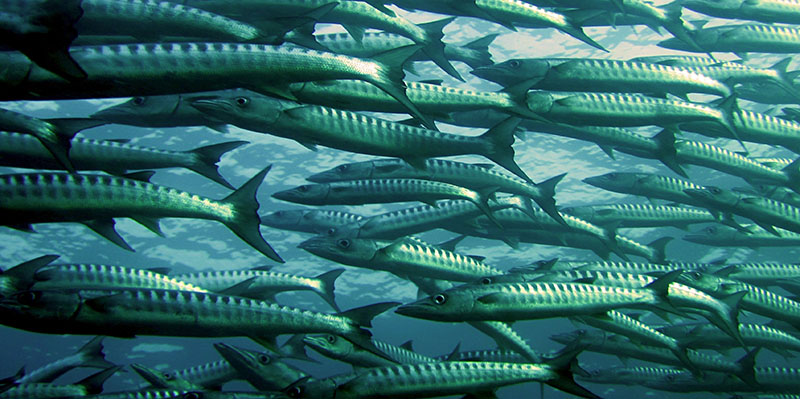
The Backlash Against Plastic
Governments around the world have begun taking stock. In 2019 legislation was proposed in California which would commit to a 75% reduction in plastic waste by 2030. In 2015 the UK government passed a law requiring shops in England to charge 5p for all single use carrier bags and in 2019 the government laid out plans to ban all plastic straws by 2020. Companies with plastic in their supply chain clearly face more government scrutiny: but perhaps a bigger threat lies in the risk to their reputation.
Plastic reduction has become an extremely emotive issue. From images of turtles tangled in plastic netting, to albatross dying from shards of plastic found in their guts, to the sheer scale of the Great Pacific Garbage patch – media attention has fed (and been fed on) the huge public outcry about the damage cheap throw-away packaging is doing. Plastic litter has been considered a nuisance for decades but programmes like Sir David Attenborough’s “Blue Planet 2” on the BBC (the most watched TV show of 2017) have hammered home the environmental cost of cheap plastic packaging, causing a sea-change in consumer attitudes to plastic. Recent Data from Ipsos shows the extent of the backlash against plastic:
71% of people globally agree that single-use plastic products should be banned as soon as possible:
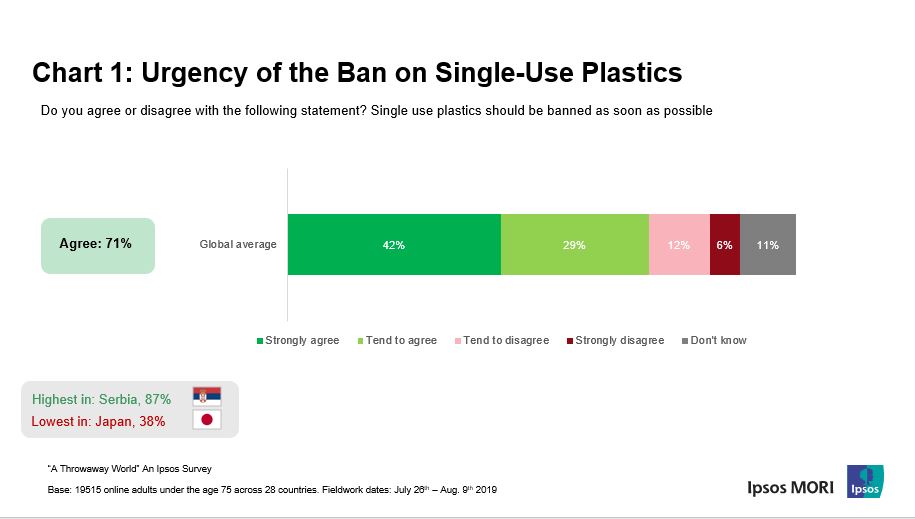
Three quarters of global consumers now agree they want to buy products with as little packaging as possible:
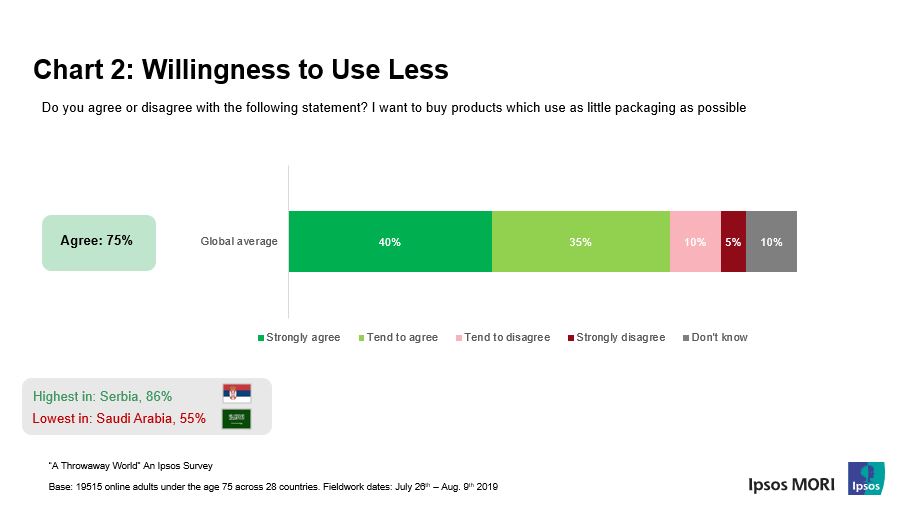
63% of global consumers say they would be willing to change where they shop if it meant they would use less packaging:
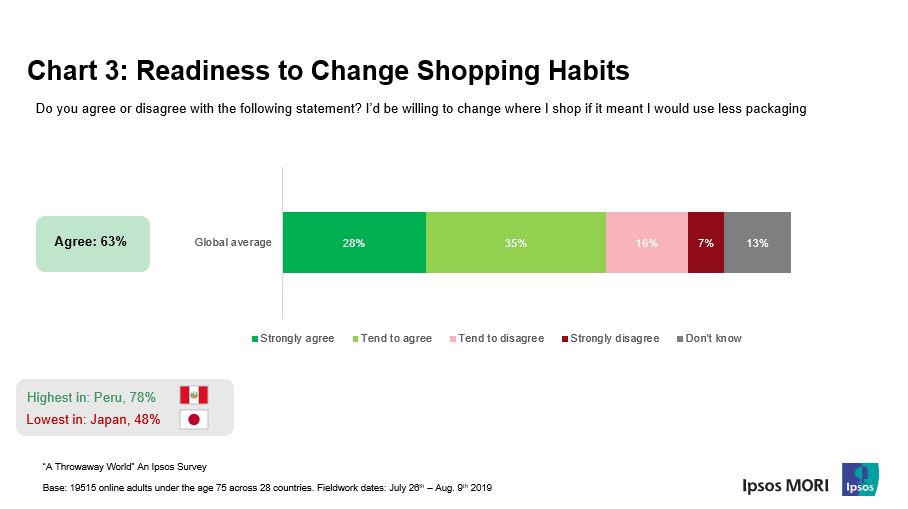
Tightened government regulation coupled with growing public concern towards plastic clearly presents a reputational risk to companies with plastic in their supply chain. Yet within this risk, also resides the potential for these companies to become part of the solution, and the potential to build their reputation by acting responsibly, aligned to the public interest, to set an example.
Case Study: Plastic Straws
Coffeeshop franchise Starbucks was among the first to recognise the change in public mood and take committed action. In 2018 Starbucks pledged to remove plastic straws from their supply chain entirely by 2020, and either use other materials or not provide straws at all . The cost implication was fairly minimal but by acting a forerunner in the movement, Starbucks benefitted from the positive publicity – enhancing their reputation as a company taking a positive step forward to a sustainable future. Ipsos research found that 38% of consumers in the US said that they were more favourable towards Starbucks after they announced that they would remove plastic straws from their stores by 2020. Favourability increased to nearly half among 18-34 year olds – one of the key drivers Ipsos use to measure a company’s reputation.
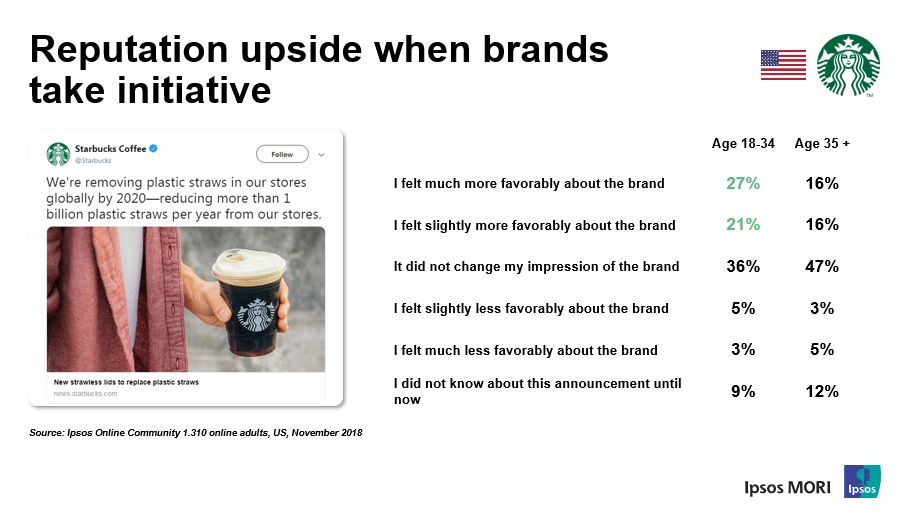
McDonalds were also quick to respond. In 2018 they began trialling paper straws in their restaurants as an alternative to plastic. However, these particular paper straws retained the key negative attribute of the plastic straws (they take an age to biodegrade), while bringing fresh negative attributes to the table – they fell apart and weren’t functional. In response tens of thousands of consumers signed a petition against McDonalds straws, resulting in the reverse impact on reputation than intended. Since then, McDonalds has invested in the launch of an "evolved" paper straw across Europe, in response to this backlash from customers, as part of the chain's 'Better M' platform to support the environment.
Conclusion & Recommendations
The use of Single-use plastic packaging has become such an emotive issue and it is so clearly visible in the supply chains of FMCG companies such as Starbucks and McDonalds, that experts coined the phrase the “plastic straw moment” to describe the point at which public pressure become so great that companies feel that they can’t not act. Both Starbucks and McDonalds took self-directed action in timely responses to growing public pressure about single-use plastic straws. ‘First mover advantage’ can lead to reputational gains, and Starbucks were able to successfully pioneer the move away from plastic straws and demonstrated good leadership in doing so. Recently Starbuck’s Chief Executive has built on this success by pledging to become “resource positive” by 2030, by capturing more carbon than the firm uses and providing more freshwater than it consumes.
However, taking the first move can leave companies vulnerable to risk and the potential for campaigns to backfire. By replacing functioning plastic straws that do not biodegrade with non-functional paper straws that do not biodegrade McDonalds initially missed the point. They opened themselves up to questions about their authenticity; did they really care about solving the environmental issue or were they simply trying to benefit from jumping on the bandwagon? The thousands of consumers signing a petition against them clearly thought they had a case to answer.
The results of ‘plastic straw moment’ are still being played out in the FMCG sector. Companies in other sectors may not have experienced their moment yet but can rest assured that it is certainly coming down the line.
Remember:
- Take control – Be self-directed and respond in a timely manner. Consumers are becoming increasingly aware and emotionally engaged in issues such as the environment which will only increase the impact they have on corporate reputation. A company’s policy on single-use plastic for example is very visible publicly and consumers can tell when a company is dragging its feet or hedging its bets. Emotive issues tend to bring about a ‘black or white’ perspective in the consumer, for brands still seen as being part of the problem this runs the risk of loss of custom or even public outrage.
- Be authentic – Ipsos research shows that companies are increasingly being put under consumer pressure to show that they’re on our side, share our values and are prepared to fight our corner. But companies need to be selective here and pick their battles aligned to their corporate identity. We have seen how consumers take a damning view on companies that do not act with the courage of their conviction. Taking shortcuts and jumping on the bandwagon will have the reverse impact on reputation than intended.
- Be forewarned and prepared – Half the battle is in anticipating emerging reputation challenges and quantifying the risk or opportunity they pose to your company. Ipsos' Corporate Reputation has 40 years’ experience in helping global businesses to navigate through such turbulence.
